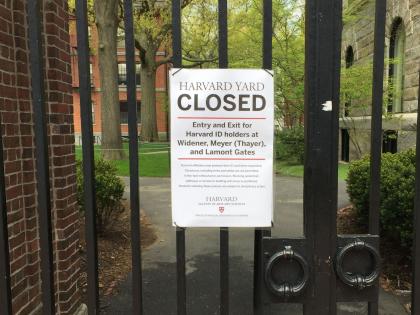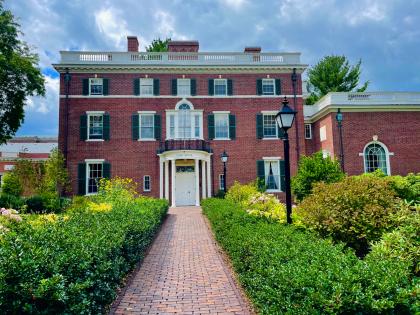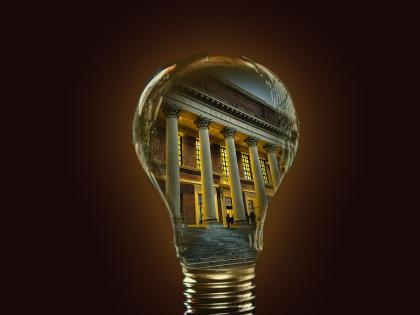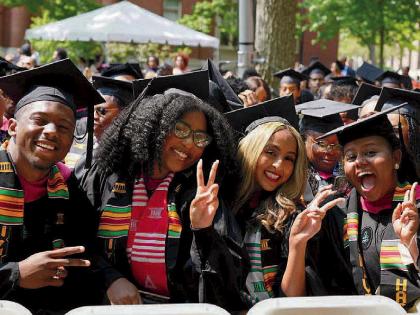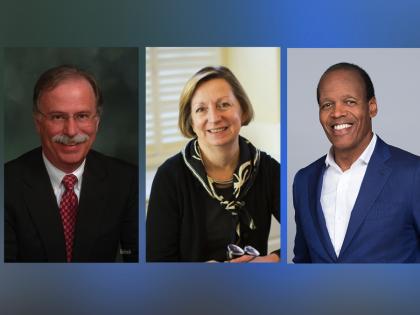1922 Sports devotee R.S. Hale, A.B. 1891, suggests to the Bulletin that there be "two Harvard football teams," instead of one, noting that when Harvard plays Yale in tennis, there are several matches. "In proportion to the number of spectators," he argues, "there is too little football."
1927 Economics surpasses English as a concentration choice for the first time, with more than 400 freshmen entering the field. Chinese archaeology, on the other hand, has a lone concentrator.
1932 President A. Lawrence Lowell has announced his resignation after more than 23 years in office. The Bulletin quips that he "has not sought to emulate the Emperor who found Rome brick and left it marble"; instead, Lowell "has multiplied the brick exceedingly."
1937 Finding themselves with too much energy after the close of football season, the "Undergraduate" columnist reports, students filled a friend's room from floor to ceiling with crumpled newspaper. The occupant shoveled every bit of paper into the entryway--covering the floor and two flights of stairs--and was turned in to College authorities by the dormitory janitor.
1942 Gasoline shortages translate to a higher bike-theft rate, causing the City of Cambridge to mandate bicycle registration and licensing to make apprehending two-wheel thieves easier.
1947 Professors have been long attempting to separate "the sheep from the goats," as the editors remark, by locking classroom doors at exactly seven minutes past the hour--the official starting time for lectures. But stragglers soon found they could sleep in anyway: as soon as the Cambridge fire department learned of the new teaching method, the lecturers were notified that obstructing emergency exits was illegal.
1952 Robert Marsh, Ed.D. '51, of Oxford University, writes to the Bulletin to criticize Harvard's parietal rules. "If a man is old enough to be an officer in the armed forces and die in Korea," Marsh reasons, "he is old enough to be left alone with a girl after dark."
1957 Crimson editors spend months preparing mock Daily Princetonian and Yale Daily News papers to distribute on those campuses the night before the Yale-Princeton football game. The editors cannot resist admitting, however, that they have been "unable to duplicate exactly the low quality newsprint of the Daily News."
1967 A student sit-in staged against a visiting Dow Chemical recruiter is Harvard's first--but the fifty-seventh demonstration to target Dow, the primary napalm supplier to the U.S. military, since the spring of 1966.
1972 During halftime of the Harvard-Cornell football game, the Bulletin reports, the band saluted "the greatest Republican president of this century" by spelling out taft. A member of the pressbox remarked: "Guess there aren't enough of them to spell Eisenhower."
1982 A handful of Harvard faculty and staff members turn from crimson to red to pose for the Lampoon's latest parody, a mock Newsweek. For the 750,000-copy enterprise, the group dress as Communist Party members celebrating the Soviet Union's sixty-fifth anniversary as Mather House co-master Patricia Herlihy bursts from a giant cake festooned with Russian script.
1987 Reverting to childhood amusements, undergraduates erect a miniature Mount Rushmore, sculpted in snow, outside of Lamont Library.
